THE LIFE AND WORKS OF THE COMPOSER
XIAN XINGHAI
Xian Xinghai is one of the most prominent composers in the recent history of modern music. He was born in Macao in 1905 and died in Moscow in 1945. In his short life he composed four chorales, one opera, two symphonies, four pieces for wind and string ensembles, one rhapsody, several hundred songs and many works for violin, piano or other instruments, both solo and in combination. His contribution makes up an important page in the annals of Chinese musical history. The works of Xian Xinghai are grounded in the popular masses and are richly tinted with Chinese national characteristics. Through contact with the musical worlds of both the East and the West, Xian Xinghai has created music which embodies the Chinese spirit. In particular, he wrote his most outstanding songs, epitomising the struggle of the Chinese people for liberation, during the hectic times of the war of resistance against Japan. • He used music, song and dance to inspire the people to fight. On the occasion of the fiftieth anniversary of the victory of the worldwide battle against fascism, the first commemoration — a truly historic event - of Xian Xinghai is celebrated in Macao, his birthplace. I am truly delighted to have been invited to take part in these commemorations and would like to express my heartfelt thanks to the organisers.
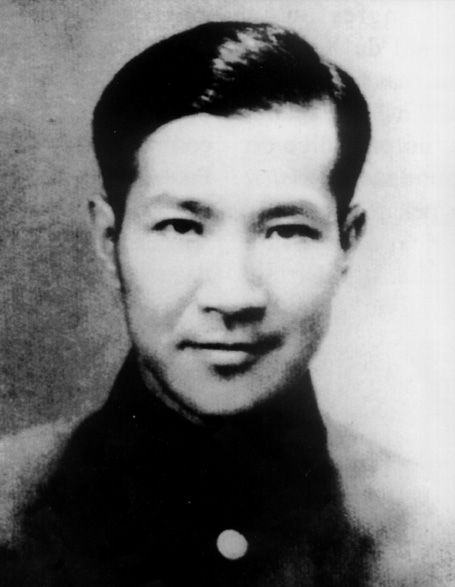 Xian Xinghai 冼星海
Xian Xinghai 冼星海
Xian Xinghai was born on the 11th of June 1905 into a poor fishing family in Macao. His father Xian Xitai• came from Fanyu• in Guangdong. • A sailor all his life, he relied on catching fish for his livelihood. But Xian Xinghai's father had died before Xian Xinghai was born, and so he was brought up by his mother and went to live in with his maternal grandfather's family. Xian Xinghai lived in Macao for six years. His formative years, spanning the transition from the oblivion of infancy until he had grown into an intelligent child, were thus influenced by that territory. After his grandfather's death in 1911, Xian Xinghai's mother took him overseas to Singapore, where she worked as a maid. In 1915, Xian Xinghai started to learn English in a British school, and a year later he passed the exam to go to Yangzheng College•, which was run by Chinese and was an affiliated annexe in Singapore to Lingnan University. • It was in this college that he received his first musical training. He learnt to play the jiguan• pipe, the piano and other instruments under the instruction of his music teacher Qu Jianfu.• In 1918, mother and son went to live in Guangzhou• and after two years, Xian Xinghai was enrolled in the secondary school attached to Lingnan University• and subsequently went on to the university preparatory class. Throughout this time, he was supporting himself and financing his education by working part-time, taking on secretarial or teaching work. He devoted his spare time to studying music. He took an active role in the activities of the school wind ensemble, which he conducted. At the same time, he learnt the violin. He was known in the school by the nickname "Southern Piper"• because he was constantly involved in musical performances and was a virtuoso clarinet player.
1926 was a turning point in Xian Xinghai' s musical study career. He bade farewell to his family and went alone to Beijing, where he studied the violin at the Beijing State Arts College, • under the guidance of Xiao Youmei• in the style of the renowned Russian violinist of the time, Tonov [?]. In September 1928 he went to the State Music College in Shanghai, which had just been built. His main concentration was the violin, but his other disciplines included musicology and the piano. In his second year, he put an article in the college publication entitled Music for All• in which he expounded his views on music for the first time and which indicates the musical path he has followed ever since. He proposed that "China has no need for aristocratic or private music — what China needs is music for all [...] Those who study music [should] take full responsibility and make moves to rescue China from its dormant state." During his time in Shanghai he became acquainted with the proponents of the contemporary opera movement and was involved in the activities of the Southern Set of musicians. In the winter of 1929, Xian Xinghai overcame, with a little help from his friends, the major difficulty of finding a way to go to Paris. Despite straitened circumstances, he supported himself while studying for five years at the Paris Conservatoire, where he studied the violin, harmony, counterpoint and composition with eminent violinist Paul Oberdorffer, musical theoretician Noel Géallon and composer Vincent d'Indy. In 1936 he gained a place in famous violinist Paul Dukna's masterclass. On 17th May 1935, Dukna died suddenly from an illness and Xian Xinghai was forced to cut short his studies. He returned to China that autumn. While in Paris, he had composed a piece for soprano voice, clarinet and piano called "Wind" and also a "Violin Sonata in D". "Wind" was greeted with acclaim in both Paris and Shanghai.
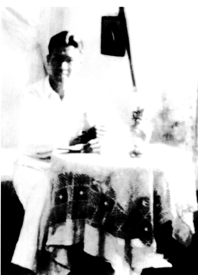 Xian Xinghai in Shanghai.
Photograph taken in 1929.
Xian Xinghai in Shanghai.
Photograph taken in 1929.
In 1935 Xian Xinghai returned to Shanghai, and in the following year secured, with assistance from friends, a job as resident composer first for the Baidai Record Company• and then for the New China Film Company. • This was perhaps the launch of Xian Xinghai' s career as a composer. At this time he began to write jiuwang • songs boosting national morale and progressive film music. The more important compositions include titles such as "Military Song to Save the Nation",• "Night Song",• "Hot Blood"• and "Youth Marching Forward".• In 1937, after the war of resistance against Japan• had broken out, Xian Xinghai became involved with the Shanghai National Salvation Song Association as general secretary. Together with the second troupe of the Wartime Touring Opera, he moved from Shanghai to Suzhou, • Nanjing, • Kaifeng• and Luoyang,• by October ending up in the centre of resistance operations against the Japanese, then located in Wuhan.• While in Wuhan, Xian Xinghai continued to do anti-Japanese propaganda performance work in the opera group. He also threw himself body and soul into public singing activities in Wuhan. In April 1934 he enrolled in the third session of the political section of the Republican government's military affairs committee, chaired by Guo Moruo•, in which was jointly responsible with Zhang Shu• for anti-Japanese propaganda music. At the same time he was busy composing his own music and produced a number of wartime songs. The better known ones include "Send an Overcoat",• "Marching up the Mountain"• "Reach the Enemy's Rear Guard",• "Guerilla Army"• and "Children of the Motherland".•
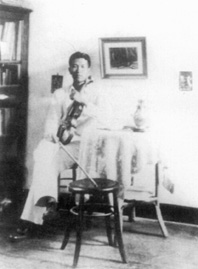 Xian Xinghai in Shanghai.
Photograph taken in 1929.
Xian Xinghai in Shanghai.
Photograph taken in 1929.
In November 1938 Xian Xinghai received an invitation from the newly established Yan'an Lu Xun Arts College• to go to Yan'an with Qian Yunling• to take up music professorships. Their duties were to organise most of the teaching of composition theory and to teach music history and conducting. They were also responsible for coordinating and coaching rehearsals for important performances. In May the following year Xian Xinghai became head of the music department and was invited to take up the additional post of professor at the Yan'an Women's University•. In 1939 he became a member of the Chinese Communist Party and from this time onwards began a new life as an artist. Yan'an provided Xian Xinghai with an excellent environment in which to be creatively productive. In addition to songwriting, during his time there he also began to work on larger musical compositions, completing masterpieces which are now acclaimed as representative of Xian Xinghai, such as the choral works "Yellow River Cantata",• "Production Chorus"• and "The Eighteenth of September Chorus".• In 1940, under the assumed name of Huang Xun, • he went to Moscow with the wellknown film director Yuan Muzhi• in order to do post production work and to add the musical score to the first large scale documentary film to be produced by the Yan'an film group. While in Moscow Xian Xinghai finished his first symphony, known as the "National Liberation Symphony".• He also put together his first suite for wind and string ensemble "Rear Guard".• In 1941, when war between Germany and the Soviet Union began as Hitler launched his offensive on the Soviet Union, Xian Xinghai, Yuan Muzhi and others prepared to make their way back to China by way of the People's Republic of Mongolia. They were unable to cross the Chinese-Mongolian border and had to retrace their steps and stay in Ulaan Baatar. In 1942 Xian Xinghai found temporary employment in the Chinese Workers Club there, where, amongst other things, he taught music theory and music history and conducted a choir for amateur musicians in the expatriate Chinese community. He was also involved in performances at the Ulaan Baatar Central Theatre. Xian Xinghai was working on his own compositions all the while, writing two songs, the "Chinese Club Song"• and the "Volunteer Army Song",• and his second and third suites (both for piano) "Horse Herding Poem"• and "Shule Song".• On the 9th of December 1942 Xian Xinghai visited the Kazakh Republic of the Soviet Union. While he was there he composed his second symphony "Sacred Battle".• This work was "[...] dedicated to the allied union of the freedom-loving British and American with the Soviet Red Army [...]" and was fully completed on the 19th of October 1943. He also completed "Three Chinese Dances",• his fourth suite "The Red Manjiang River"• and a book entitled Life in China.• Xian Xinghai moved once again in January 1944 after which he completed works for violin including "Ten Song Poems"• and a "Collection of Kazakh Songs",• and also a symphonic poem. In the winter of 1944, Xian Xinghai contracted pneumonia as a result of the hard life he was leading and the long hours he was working. In early 1945 he was sent to the Kremlin Hospital in Moscow for treatment. While he was in hospital he continued to work on the wind and string piece "Chinese Rhapsody".• Treatment was ineffective against the many illnesses he now suffered from, and he passed away at then the Kremlin Hospital on the 30th of October 1945. He was forty years old. His ashes are preserved in Dunsk Orthodox Church in the Moscow suburbs and were only moved back to China on the 25th of May 1983, after which on the 12th of December a formal burial ceremony was held in Xinghai Park• in Guangzhou's Luhu• district. On the 14th of November 1945 a memorial ceremony for Xian Xinghai was held in Yan'an, for which Mao Zedong• wrote a poem: In mourning for the People's Musician Xian Xinghai.
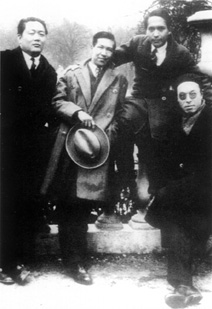
Xian Xinghai (holding a hat) with friends in the Jardin du Luxembourg, in Paris.
Photograph taken in 1935.
Xian Xinghai's compositions may be roughly divided into four groups on the basis of the location of their composition: France, Shanghai and Wuhan, Yan'an and lastly the Soviet Union and Mongolia. The pieces written when he was in France are mostly solo, duet or vocal chamber works, characterised quite evidently by contemporary French music, suffused with themes relating to his own life experience. Compositions dating from the Shanghai and Wuhan period (1935 to 1938) comprise mainly music for the progressive films of the time and songs to boost national morale during the war of resistance against Japan. This music is clearly influenced by the innovative film music of the 1930s representative of Nie Er' s• work and reflects the masses' patriotic fervour in the war against Japan and the struggle to avert the country' s decline and the rejection of colonialism and feudalism. The two years from 1939 to 1940 spent in Yan'an saw mainly the composition of large scale vocal suites and operas, in a typically fiercely individual style which blended Chinese and Western elements. The thematic content of these works is concerned mainly with the steadfast resolution and unbending fighting spirit of the Chinese in the battle for victory against the Japanese invaders. The body of work created in the Soviet Union and Mongolia consists chiefly of longer instrumental works, not all of which were given an opportunity to be performed due to wartime chaos, a fact which Xian Xinghai regretted deeply. Of these four periods of composition, the two spanning the years 1935 to 1940 are the most important, since much of the work from these periods provoked significant reaction at the time of its creation and was assured an unassailable place in the history of Chinese music. From a musicological point of view, the larger vocal suites were the most significant genre in Xian Xinghai's music, especially the "Yellow River Cantata", which has emerged as his most influential and artistically most sophisticated work. "Yellow River Cantata" is still performed today both in China and worldwide, having endured several decades and still showing no signs of fading. It is a masterpiece which has become a landmark in Chinese musical history.
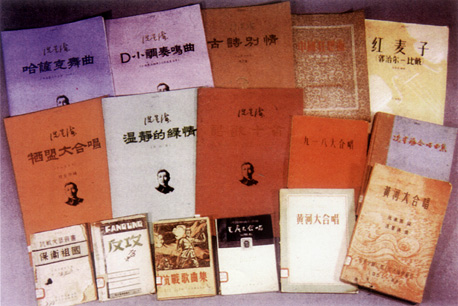
Assorted works by Xing Xinghai.
Xian Xinghai made an undeniably significant contribution to the development of the music of the Chinese people. His effort glorifies his native Macao and the whole of the Chinese nation. May he never be forgotten. □
Translated from the Chinese by: Justin Watkins
Back row. Left to right:
•Hasake wuqu• (Kazak Dance Music).
• Di xiaodiao zoumingqu• (Sonata — D minor).
• Gushi bieqing• (Sorrowful Farwell)
• Zhongguo kuangxianqu• (Chinese Rhapsody).
• Hong maizi• (Red Sorghun).
Centre row. Left to right:
• Ximeng dahechang• (The Sacrificial Alliance Cantata).
• Wenjing de lüqing• (Green, Mellow and Smooth Feelings).
• Shige shishou •(Ten Poems).
• Jiuyiba dahechang• (The 18th of September Cantata).
• Xian Xinghai hechangqu ji• (A Collection of Hymns by Xiang Xinghai).
Front row. Left to right:
• Baowei zuguo• (Fighting for the Nation).
• Fagong• Counter-attack.
• Kangzhan gequ ji• (Collection of Songs from the War of
Resistance Against Japan).
• Shengchan dahechang •(The Production Cantata).
• Huanghe dahechang • (The Yellow River Cantata).
• Huanghe dahechang • (The Yellow River Cantata).
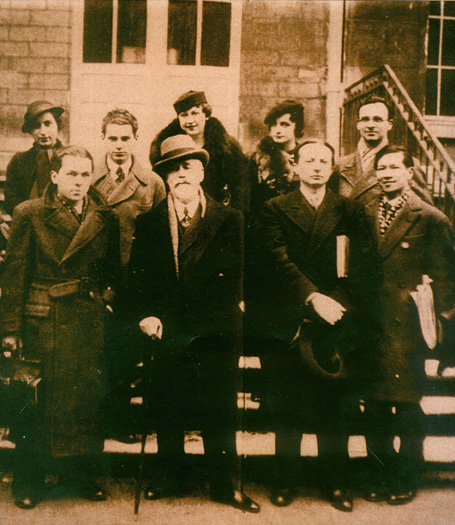
Xian Xinghai (from extreme right) with fellow students and their music teacher (front centre, with a cane) at the Paris Conservatoire.
Photograph taken in 1935.
TEN SONGS
Xian Xing Hai
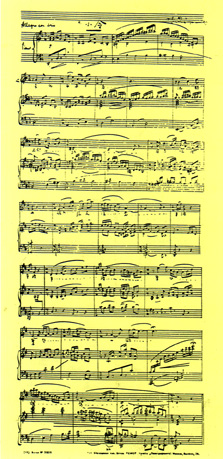
"Xiaoling"1小令
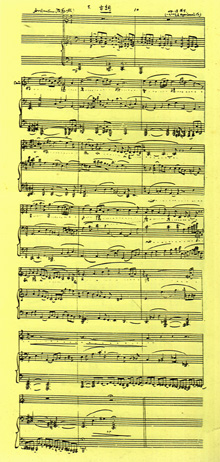
"Guci"2古詞
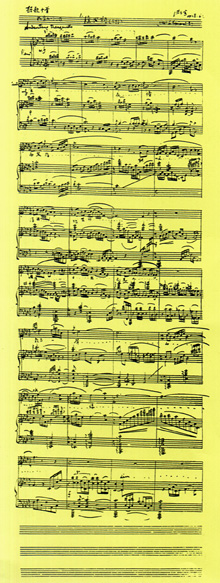
"Yuguangci"3漁光詞
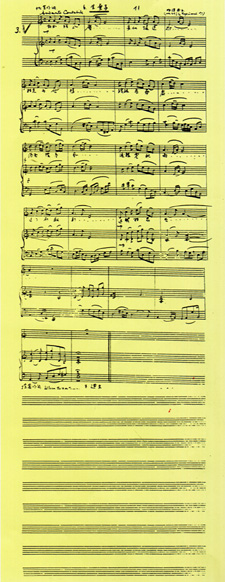
"Shengzhazi"4生查子 莿
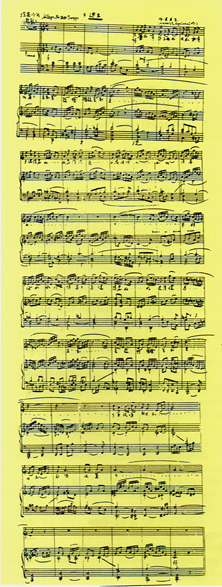
"Huiwen"5 迴文
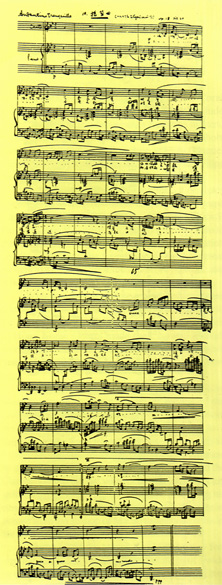
"Yaolangqu"6 搖籃曲
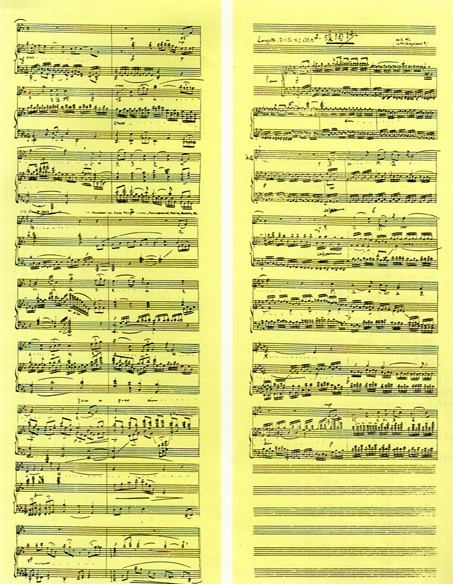
"Langtaosha"7 浪淘沙
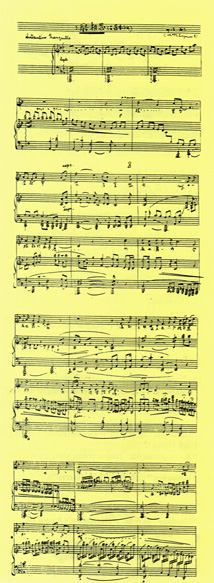
"Kuxiangsi"8酷相思
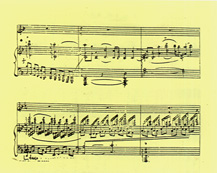
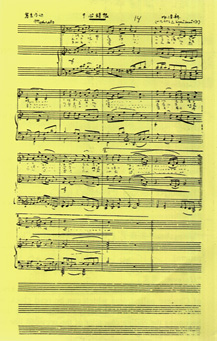
"Xintouhen"9心頭恨
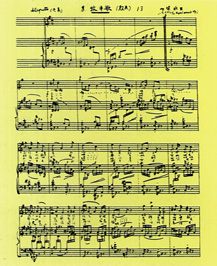
"Muniuge"10牧牛歌
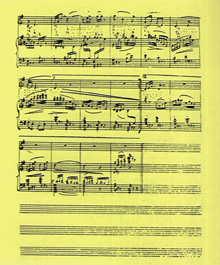

Qing
NOTES
1 "Xiaoling"小令.
[Generic literary classification of classic poems usually referring to 'shorter poems' — frequently meaning poems not exceeding fifty eight characters — in contrast to 'daling' referring to 'longer poems'].
2 "Guci"古詞.
[Generic typological classification of classic poems; 'gu'(ancient, old, classic) + 'ci' (poetical mode, genre, style)].
3 "Yuguangci"漁光詞 ("Fishing Light")
[Generic prosaic title of classic poems with a musical pattern].
4 "Shengzhazi"生查子 ("Growing Thorntree")..
[Generic prosaic title of classic poems with a musical pattern].
5 "Huiwen"迴文
[Generic structural classification of classic verses; a kind of Chinese palindrome which can be read clock or counterclockwise, the beginning character of one line becoming the ending character of the previous line or vice-versa].
6 "Yaolanqu"摇籃曲唯 ("Song of the Cradle").
[A lullaby.]
7 "Langtaosha" 浪淘沙 ("Waves Splashing on the Sand").
[Generic prosaic title of classic poems with a musical pattern].
8 "Kuxiangsi" 酷相思 □ ("Desesperately Longing for Each Other".
[Generic prosaic title of classic poems with a musical pattern].
9"Xintouhen" 心頭恨 ("Deep Hatred").
[A poem.]
10 "Muniuge" 牧牛歌 ("Herdsmen's Pastorale").
[A song.]
* Graduate from the Beijing Central Conservatory, • in Beijing. Former musical aesthetics head (1986-1990) and deputy head (1990-1992) of the Musicology Department, • presently is Vice-Principal (1992-1195) of the Beijing Central Conservatory. Awarded with the Beijing City Prize for Outstanding Achievement in Philosophy and Sociology (1990). Director of the Institute of Musicology, • the Chinese Doctoral and Research Student Teaching Association, • the Chinese Aesthetics Society, • and of the standing committee of the Beijing Higher Education Council. • Member of the Beijing Musicians' Association Theoretical Study Committee, • the Chinese Comparative Literature Society, • and the Beijing Musicians' Association. • Author of publications in related topics, including: Proponents of reform in the operatic arts•, Singing with tearful eyes, • Fundamentals of musicology• (with Zhang Qian•), The musician's forum on literature and art - an aesthete's comparative appraisal of music and other forms of art• (a collection of articles edited and compiled in collaboration with other writers). Editor-in-chief of the periodical "Musicology"•.
start p. 129
end p.